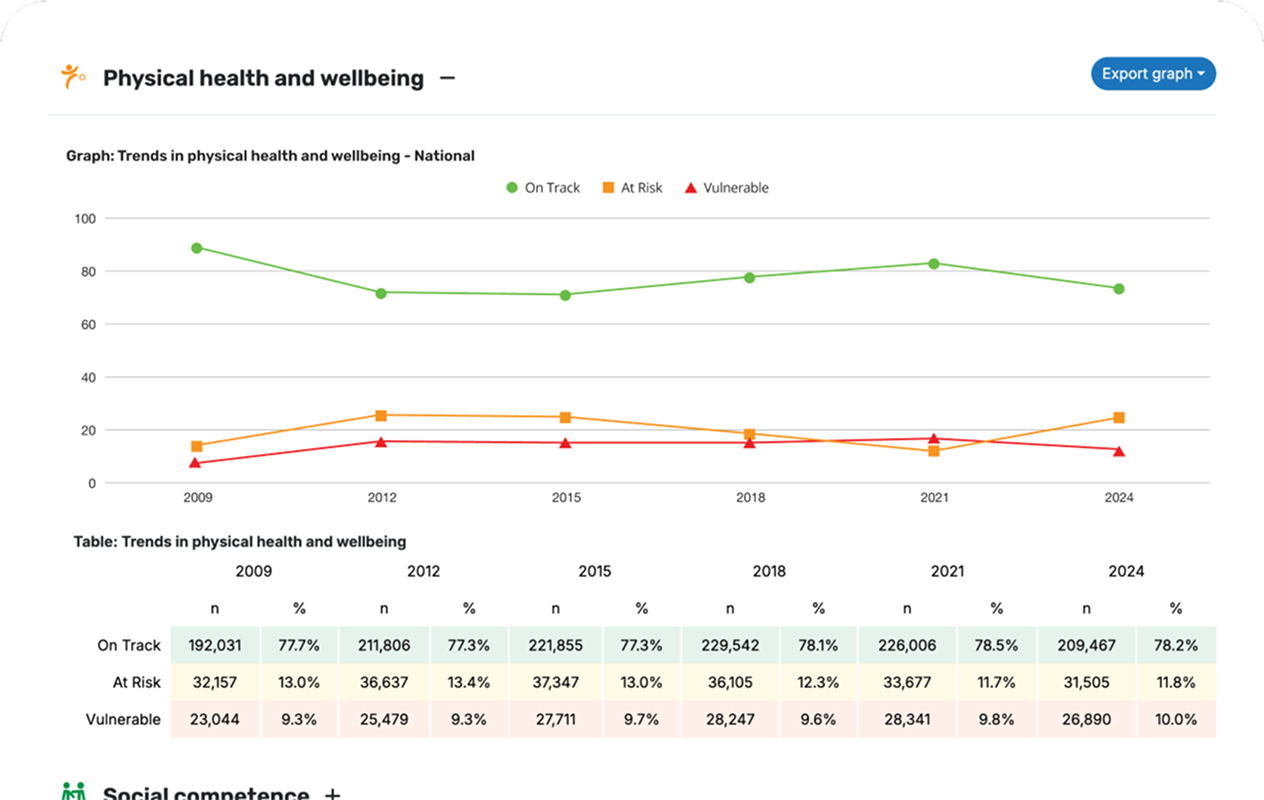
Date: June 2024
AEDC Cycle: Cycle 1 (2009), Cycle 2 (2012), Cycle 3 (2015), Cycle 4 (2018), Cycle 5 (2021)
States: VIC
Data Linkage Project: No
Organisation: University of Melbourne
The first 1000 days following conception are crucial to laying the foundations of a child’s lifelong health, wellbeing, and developmental potential. The perinatal period (just prior to conception and throughout pregnancy) is a particularly vulnerable time, when a mother’s health and her use of medications can have a significant impact on her child’s future life course.
Date: June 2024
AEDC Cycle: Cycle 1 (2009), Cycle 2 (2012), Cycle 3 (2015), Cycle 4 (2018), Cycle 5 (2021)
States: ACT, NSW, NT, QLD, SA, TAS, VIC, WA
Data Linkage Project: No
Organisation: ASDF Research
The Continence Foundation Australia is undertaking a project to collate data to better understand the toileting habits of infants and young children in Australia. The first stage of the project is to bring together existing data on the topic.
Date: January 2024
AEDC Cycle: Cycle 4 (2018)
States: VIC
Data Linkage Project: Yes
Organisation: Murdoch Children’s Research Institute
Between July 2018 and March 2021, the AQUA Study children, aged between 6-8 years old attended a developmental assessment, which used sensitive measures to look at specific areas of neurodevelopment as well as measures reported by the mother, especially in the area of behaviour and social communication. Data collection of our Early School Years Follow-up, the AQUA at 6 was completed in March 2021.
The aim of this linkage project is to explore how far our standardised testing correlates with the teacher-reported five domains of the AEDC. The project is looking to discover whether AQUA’s detailed assessments identify issues that are not evident in the school setting in the child’s first year, or if the research is missing emerging problems that are already evident at school.
These results would not only be of interest to alcohol in pregnancy researchers and health and education professionals, they would also inform the nature of future data collection in this cohort of children. Findings are also likely to have important clinical implications as children need to have multi-disciplinary assessments for a diagnosis of Fetal Alcohol Spectrum Disorder, highlighting the potential need to consider teachers as information providers in a clinical setting to have a truly holistic assessment of the child at risk.
Date: January 2024
AEDC Cycle: Cycle 1 (2009), Cycle 2 (2012), Cycle 3 (2015), Cycle 4 (2018)
States: NSW
Data Linkage Project: Yes
Organisation: University of Technology Sydney
The research will address a significant evidence gap pertaining to the long-term outcomes following specialist neonatal care, and how this interacts with the social determinants of health. With international studies showing significant returns to early childhood investment, particularly for disadvantaged groups, the research will meet the urgent priority of generating an Australian evidence base in an area of both substantial resource use and technological advancement. The project brings together a team of methodological research experts and leading clinicians with proven links to policy and consumer circles. The outcomes of this project will be to inform decision-making faced by policymakers, administrators, clinicians and consumers, redress inequalities where they exist, and improve resource use.
Date: January 2024
AEDC Cycle: Cycle 1 (2009), Cycle 2 (2012), Cycle 3 (2015), Cycle 4 (2018)
States: NSW
Data Linkage Project: Yes
Organisation: University of New South Wales, Sydney
The research project will generate evidence within three main themes:
1. medicine use in pregnant women and children;
2. pregnancy and perinatal health; and
3. child health, development and wellbeing.
The first planned sub-project aims to use AEDC data to assess child development in association with maternal use of prescription opioids during pregnancy. Furthermore, this linkage study will provide evidence of the effectiveness of policy and programs which are often rolled out in a non-random fashion, without prior quality evidence of their effectiveness. In such cases, the best opportunity to understand their effectiveness lies in the application of quasi-experimental methods to routinely collected data.
Date: January 2024
AEDC Cycle: Cycle 1 (2009), Cycle 2 (2012), Cycle 3 (2015), Cycle 4 (2018)
States: VIC
Data Linkage Project: Yes
Organisation: Consultative Council on Obstetric and Paedriatric Mortality and Morbidity (CCOPMM)
Fetal in utero neurodevelopment is a critical process that is inextricably linked with early childhood development. The factors in pregnancy that influence early childhood development are complex and poorly understood. There is an increasing trend worldwide towards both earlier gestation at delivery and iatrogenic delivery. Decreasing birthweight and birthweight centile has also shown to be associated with poor outcomes. The long-term developmental outcomes of these babies need to be assessed.
In Australia, there are 3 primary tools used to assess early childhood development on a population level - the Parents' Evaluation of Development Status (PEDS), the Australian Early Development Census (AEDC) and the National Assessment Program - Literacy and Numeracy (NAPLAN).
We seek to assess how gestation, birthweight, birthweight centile, and iatrogenic intervention are impacting the long-term neurodevelopmental outcomes of children and infant feeding in a longitudinal, retrospective, population-based study in Victoria.
Date: December 2019
AEDC Cycle: Cycle 2 (2012), Cycle 3 (2015)
States: VIC
Data Linkage Project: Yes
Organisation: Mercy Hospital for Women, University of Melbourne
This project investigates the childhood outcomes of children in whom the pregnancy was complicated by diabetes. The short term implications of diabetes in pregnancy are well known, but there is very little documented about outcomes outside the newborn period, apart from cardiovascular disease.
Date: August 2017
AEDC Cycle: Cycle 1 (2009), Cycle 2 (2012), Cycle 3 (2015)
States: NT
Data Linkage Project: Yes
Organisation: Northern Territory Department of Health
Date: May 2015
AEDC Cycle: Cycle 1 (2009), Cycle 2 (2012)
States: ACT, NSW, NT, QLD, SA, TAS, VIC, WA
Data Linkage Project: No
Organisation: Telethon Kids Institute
Perinatal and birth data are routinely collected in each Australian state and territory though there is some variation in the data collected between jurisdictions. This project seeks to link perinatal and births data to the Australian Early Development Census (AEDC) and then on to early education records and, in doing so, track an individual’s trajectory through life. The significant advantage of population wide linked data systems is that they present unbiased (relative to survey samples) large samples to investigate small population groups, such as Indigenous children. To be able to do so across jurisdictional boundaries additionally creates opportunities that we haven’t had before. This information on the early determinants of children’s health, development and wellbeing is of particular interest to governments to inform the services provided to support children and their families.
Date: May 2015
AEDC Cycle: Cycle 1 (2009), Cycle 2 (2012)
States: ACT, NSW
Data Linkage Project: Yes
Organisation: Clinical and Population Perinatal Health Research, Kolling Institute of Medical Research, University of Sydney
This study involves the comprehensive record linkage of routinely collected population perinatal, health, newborn screening and education data to establish an Australian reproductive cohort of women and children to investigate patterns and trends in maternal and child health, health care utilisation and development. This research provides a unique opportunity to investigate maternal and infant health and developmental issues on a population-level basis. It will investigate emerging issues in: assessment of early pregnancy serum biomarkers to identify pregnancies at-risk; increasing obstetric and neonatal interventions and quality of pregnancy care; infants undergoing newborn screening; and the impact of each of these on infant and child health and development outcomes.
Date: June 2014
AEDC Cycle: Cycle 1 (2009)
States: ACT, NSW, NT, QLD, SA, TAS, VIC, WA
Data Linkage Project: Yes
Organisation: Population Health Research Network
This research investigates patterns of child development within and across jurisdictions. It explores the relationship between perinatal outcomes and developmental outcomes as measured by the AEDC through to educational outcomes. It also expands the research capacity in data linkage methods and provides the platform to develop international comparisons by the use of the Early Development Index.
The research informs public policy and provide evidence based information for services to the wider community. The research brings together federal and state governments across health and education.
Community Data Explorer
Navigate the AEDC Community Data Explorer and understand the data.
